[70 Years of ODA - 3] Years of Cooperation, Past and Future: Interviews with the Indonesian and Turkish Ambassadors to Japan
2024.03.25
This year, Japan marks the 70th anniversary of its initiation of Official Development Assistance (ODA). Ambassadors from Indonesia and Türkiye, two countries with which we have long-standing friendly relations, were invited for interviews. We asked them about the role played by Japan's ODA and JICA, as well as their expectations for the future.
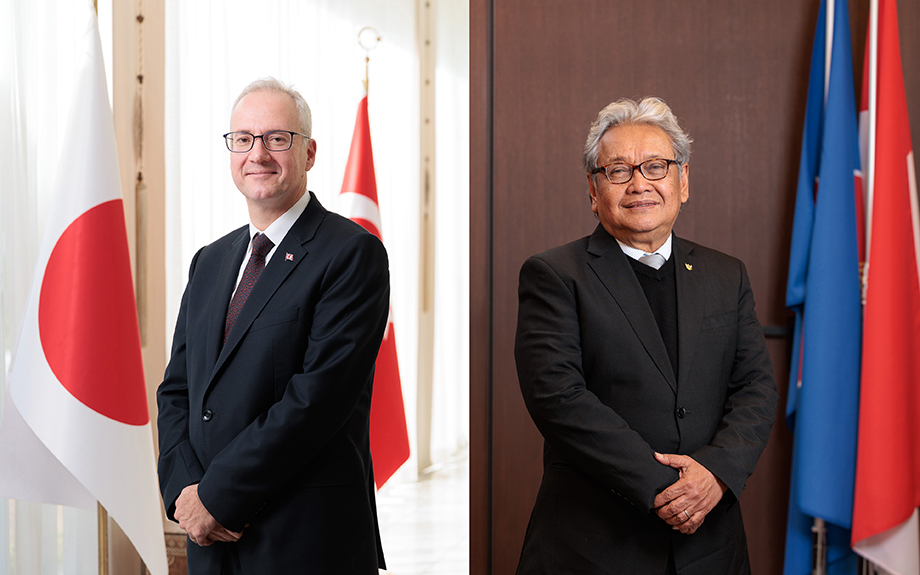
Indonesian Ambassador to Japan Heri Akhmadi (right) and Turkish Ambassador to Japan Korkut Güngen (left)
Japan and Indonesia mark the 66th anniversary of their relations this year. Ambassador Heri Akhmadi spoke of the impact of the JICA-supported Jakarta subway system, steps being taken in energy transition, and the importance of human resource development.
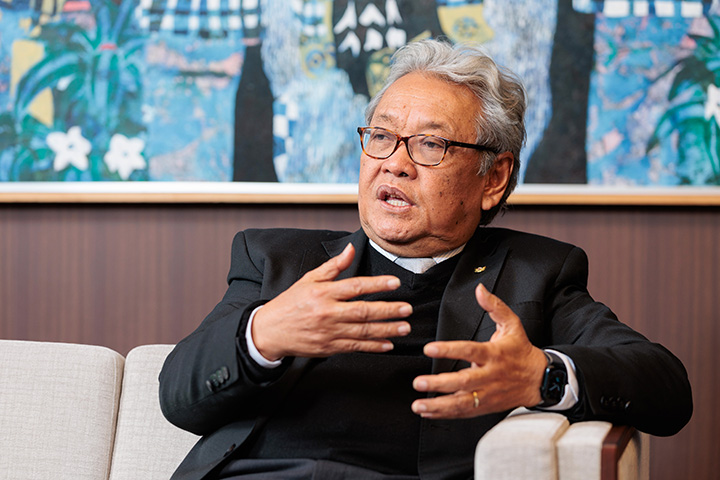
This interview was conducted at the Embassy of Indonesia in Tokyo
—Are there any JICA initiatives in Indonesia that have left a particularly lasting impression on the country?
Ambassador Akhmadi: JICA has been involved with many important programs over the years, many of them infrastructural projects. It has also supported a lot with technical assistance, which includes sending our engineers and students to Japan to study. These programs have had a huge impact, because in order for a country to progress, it must develop human resources as well. JICA has played a strong role in supporting our university development—not only the physical support, but funding scholarships for many Indonesian lecturers to study in Japan. Today, many of the alumni of these programs have high positions in our government or have high level professional business careers.
—Are there any specific initiatives that you were personally involved in?
Ambassador Akhmadi: From 2002 to 2004, I was appointed by the president to be a member of the Indonesia Japan Economic Policy Dialogue. This was an attempt to find solutions after the economic crisis of the late 1990s and early 2000s. The program included political reform, which was being undertaken during the later years of the crisis, when we had a new government after Suharto. In a partnership with JICA, I and my partner, Prof. Takashi Shiraishi, established the Lembaga Survei Indonesia (LSI), the Indonesia Survey Institute. It was very important in guiding our democratic development by using a scientific approach to measure the opinions of the people. It was the first of its kind at that time, and it came about thanks to JICA’s contribution.
—LSI was a polling organization that was actually a groundbreaking initiative, wasn’t it?
Ambassador Akhmadi: Exactly. Previously we didn’t have any polling capabilities. During the Suharto era prior to democratic reform, we knew the results of the election before it was held. Using the polling tools, we could understand the trends of public opinion including political choices. I think the impact was huge. Actually, some of the people from LSI went on to form their own organizations, and today we have more than 30 of these institutions.
—JICA was also involved in the Jakarta Mass Rapid Transit (MRT) System project, the 15.7km subway that was inaugurated in 2019. Have you ever used the subway?
Ambassador Akhmadi: In fact, the last time I was in Jakarta, I was accompanying the Japanese emperor on a visit to the MRT depot. The emperor was very impressed, not only with the system itself, but also with the female operators he spoke to. All of the operators now are Indonesian, and it seems that about 50 percent of them are women.
—What is the perception of the MRT by the Indonesian general public?
Ambassador Akhmadi: Very enthusiastic. In my report to the president, I described the depot as being “like a mosque,” because it was so clean. There have been zero accidents on the MRT and the OTP, on-time performance, is 99.8 percent. That was unheard of in Indonesia before the MRT. Also there have been zero crimes reported over that time. I believe that the project was not only important for improving the infrastructure of our metropolis, but it actually changed our urban culture thanks to the factors I just mentioned. It is important because it directly affects the people. And it changed the way we think.
The Jakarta MRT train
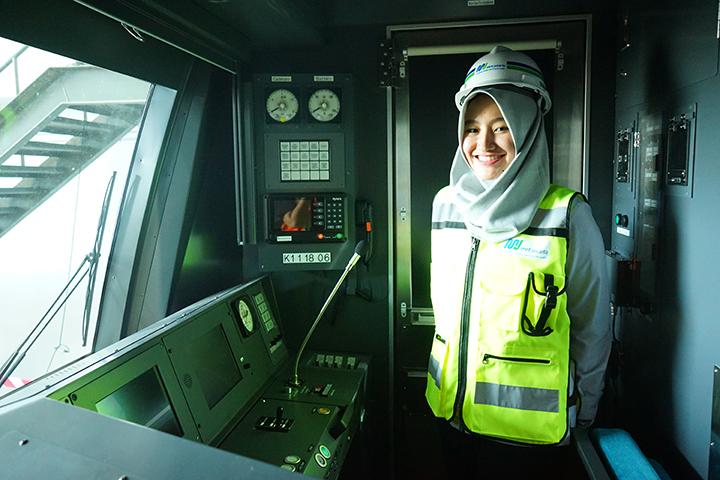
An Indonesian technician engages in vehicle maintenance
—Energy reform has become an urgent issue with the ongoing changes in climate. What initiatives is the Indonesian government undertaking in cooperation with JICA regarding decarbonization and energy transition?
Ambassador Akhmadi: We worked with Japan on a memorandum of cooperation regarding energy transition, after which we announced the development of AZEC, Asean Zero Emission Community, in Nov. 2022. We then moved beyond a bilateral format to become more multilateral. In March, 2023, we launched AZEC in Tokyo, attended by Japan, 9 ASEAN countries and Australia. Now we are in the process of implementation. Japan has already committed to help us start with a loan of USD 500 million.
Japan is also involved with us on JETP, the Just Energy Transition Partnership, along with other countries like the U.S. And some Japanese companies are working with Indonesia on CCS, carbon capture storage. We have a very big CCS project in one of our oil fields that will be the first of its kind in Indonesia. I believe that hydrogen will be the energy source of the future.
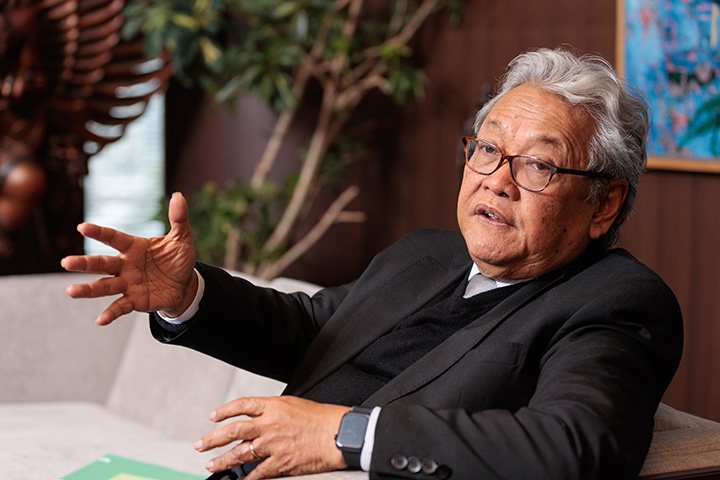
The Indonesian ambassador expresses the hope for further strengthening of relations with Japan towards energy reform
—How would you like to see JICA’s partnership with Indonesia continue in the future?
Ambassador Akhmadi: Historically, Japan and Indonesia are very close, but there are a number of things we could do in developing our relationship even further. For example, and I’ve discussed this with our president, Japan and Indonesia are complimentary in a demographic sense. We have natural resources, and a large population of young and capable people. Japan has capital, advanced technology, expertise and knowledge. If we can pool our resources and match our youth with Japan’s experience, it will be a powerful force in the future. Right now, the number of Indonesian students in Japan is very low, about 7000, while Vietnam has more than 50,000 and China even more. We would like to see an increase, not only in the number of students, but also the number of research projects in Japan.
—So you want to emphasize human resource development as well as large-scale infrastructure projects?
Ambassador Akhmadi: Big infrastructure projects can be conducted with the private sector. I believe we can develop anything once we have the right human resources. I’d like to see JICA more involved in bringing Indonesian students and associates to Japan, and helping revitalize our training centers in Indonesia. That way, we could eventually bring more Indonesians to work in Japan—not as entry level workers, but as highly skilled human resources. Last month, our governments agreed to target sending 100,000 Indonesians to work in Japan. I think the important thing is not the numbers, but training our workers to a level that they can adapt well to working in Japan. Our relationship with Japan is very close—we say we have “the same heart”—and through human resource development we can become even closer.
This year, Japan and Türkiye are celebrating the 100th anniversary of the establishment of diplomatic relations between the two countries. Ambassador Korkut Güngen described JICA’s cooperation in projects in Türkiye, the destruction and recovery following the massive earthquake of February 2023, and the similarities of issues facing the two countries.
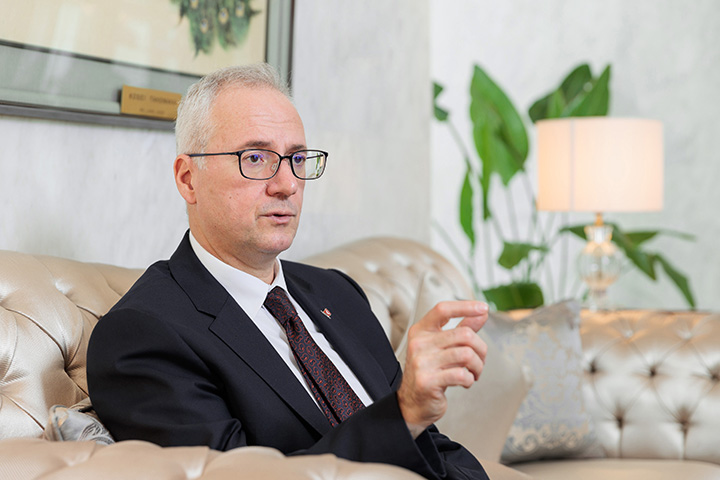
Turkish Ambassador to Japan Korkut Güngen at the Embassy of Türkiye in Tokyo
—JICA has been involved in various initiatives in Türkiye. Are there any projects you feel have had a particularly powerful impact on your country?
Ambassador Güngen: The first project that immediately comes to mind is the support that JICA provided in the construction of the Marmaray Tunnel, the 13.5km underwater rail tunnel that passes beneath the Bosphorus Strait. It has certainly had a huge impact on the daily lives of people in Istanbul. I’m from Istanbul and when I cross the Bosphorus I often choose to go via the tunnel instead of taking the bridge, which suffers from high traffic.
—Türkiye has accepted a large number of refugees from Syria and other countries, and JICA has supported these efforts. What is the impact of the support for improving the infrastructure for the refugee community.
Ambassador Güngen: The support we receive from JICA to help with refugees is extremely important. Following the conflict in Syria in 2011, we accepted a lot of asylum seekers from Syria—not only Arabic people, but from many ethnic groups. The official figures that we have for refugees is now around 3.7 million. Most of them have settled in Türkiye for now, and they receive social care and security at a very high level, including schooling for their children. The support we got from JICA was of immense help.
—Last year, after a major earthquake struck Türkiye, Japan quickly dispatched an emergency disaster relief team. You met with the Japan Disaster Relief Team (JDR) and even saw them off at the airport.
Ambassador Güngen: I tried to be present when every JDR team left Japan as I wanted to thank them for their support and assistance. Only 12 hours after the earthquake, the JDR rescue teams were at the airport with full gear to go to a country 10,000 km away. JICA was the main organization to coordinate the search and rescue team, and following that provided other assistance, such as health and medical assistance and expert teams on recovery and reconstruction. Japan was also involved in organizing other multinational efforts, such as carrying tents from Pakistan to affected area conducted in a framework of JDR assistance. One of the most impressive things JDR did was establish a very advanced one field hospital, including the medical staff. And the support we received from the Japanese public was memorable. We are very grateful.
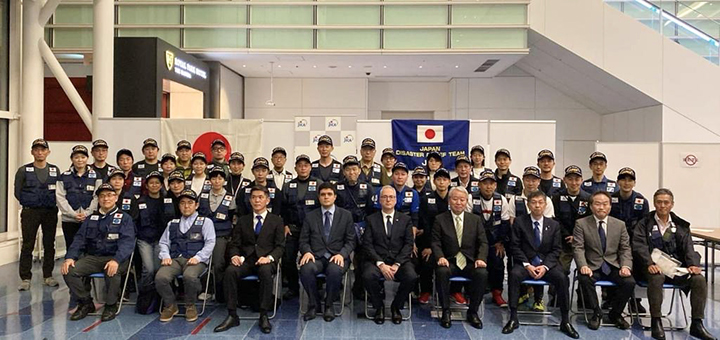
Ambassador Güngen (front row, fifth from right) at the airport to see off the Japan Disaster Relief Team (JDR) deployed to Türkiye.
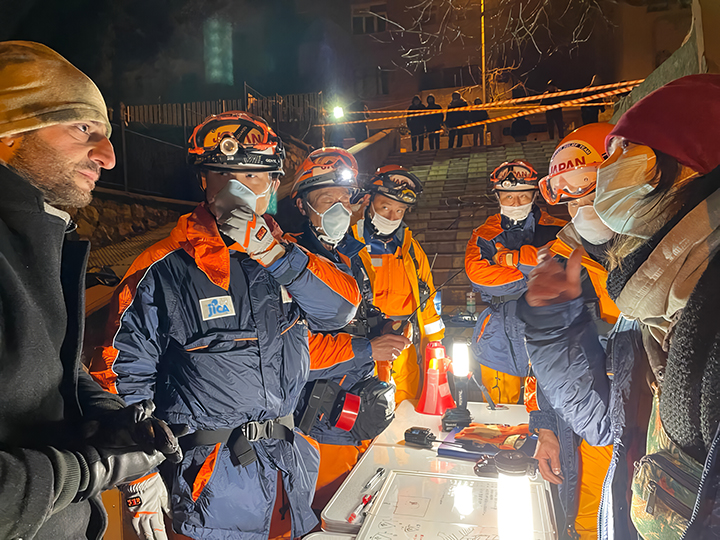
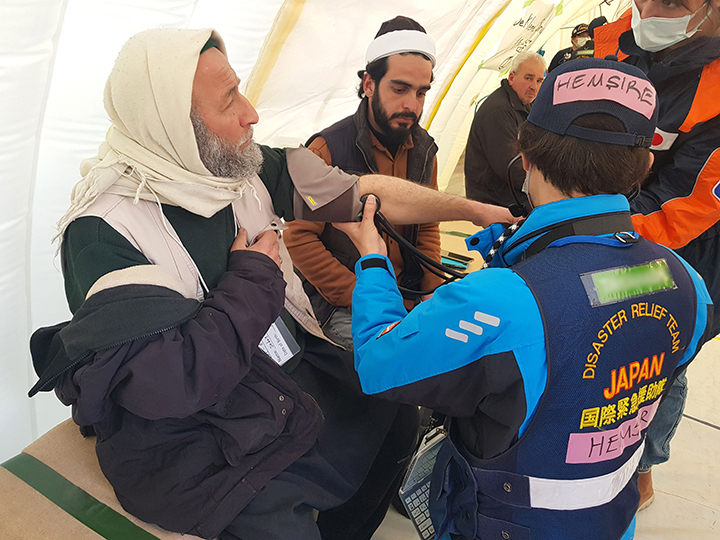
Immediately after the earthquake, the Japan International Disaster Relief (JDR) rescue team and medical team was dispatched to Türkiye through JICA
—Are there any other long-term initiatives regarding disaster issues?
Ambassador Güngen: JICA is very much involved in working with local authorities in Türkiye in natural disaster response, particularly earthquakes. Some of our mayors, for example, come to Japan in that context. There was also a recent loan agreement for a JICA project supporting small and medium sized enterprises in the earthquake damaged areas. That will have a huge impact, as those are the hardest hit places.
—This year marks the 100th anniversary of diplomatic relations between our two countries. Are there any events scheduled to commemorate this landmark?
Ambassador Güngen: We will hold a number of events, and will use the occasion to develop our bilateral relationship. One is the launch of the Turkish-Japanese University of Science and Technology. Although it is not a full-fledged university yet, it will officially start its education program at post graduate level this year. JICA is also supporting the initiation of this university.
—The campus is well on its way to becoming an important institution, isn’t it?
Ambassador Güngen: The land is there, and they have a number of facilities and offices. There is a rector from Türkiye and a provost from Japan. There is a council comprised up of Turkish and Japanese officials and academics. Last year they organized an event in Istanbul and the Ministry of Foreign Affairs participated. This year we will hold major events along with the opening of this university, so we will be working with JICA on this as well.
—From your point of view, what makes this university so meaningful?
Ambassador Güngen: First, it is fantastic to have an academic institution in Türkiye that reflects the long friendly relations between our countries. Second, Japan is very developed technologically and scientifically, so Japan’s investment means a lot. I expect that the university’s impact will not be limited to Türkiye but be felt throughout the region.
—What kind of curriculum will be offered?
Ambassador Güngen: Initially, the program will focus on natural disasters and earthquakes, with a further focus on environment and energy. Those programs were chosen to reflect our bilateral relations. We have similarities, both being countries in areas that suffer from earthquakes, so we can share experiences and work together. The area of environment and energy is equally strategic because we both must import our energy resources. Given the tendency to develop renewable energy resources, there’s a lot we can do with that, including working on energy storage and energy efficiency issues. Despite the fact that it will be a Turkish-Japanese institution, it will not be closed to other countries’ academics. It will be like any other international academic institution.
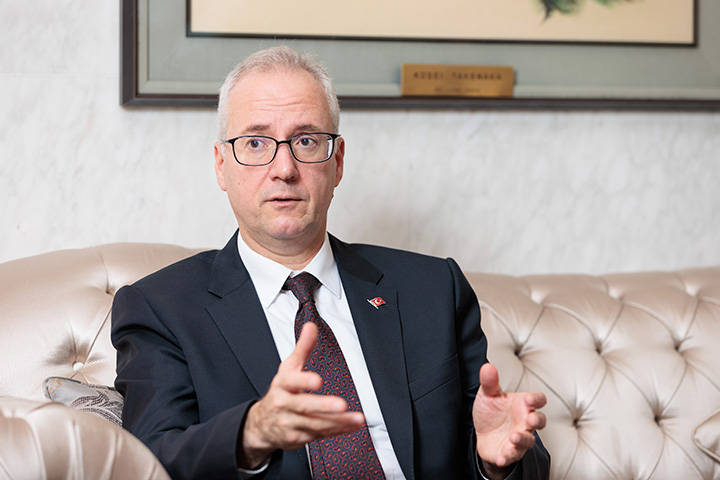
Ambassador Güngen spoke of the education program of TJU, the Turkish-Japanese University of Science and Technology. The launch of this educational institute is taking place on the 100th anniversary of diplomatic relations between Türkiye and Japan
—Are there other areas of cooperation that you see growing in the future?
Ambassador Güngen: There are all sorts of projects that we can work on with JICA. Unfortunately, the issue of natural disasters will not go away, so we will need continued support. But it will also be possible to work with JICA in other countries. We have a similar institution in Türkiye, called TIKA (Turkish Cooperation and Coordination Agency), and AFAD (Disaster and Emergency Management Authority) for natural disasters, rescue and assistance. Through partnerships we could expand our cooperation with JICA to other countries.
—How are JICA’s activities perceived by the Turkish public?
Ambassador Güngen: The perception of Japan in Türkiye is very positive, just as it has been for the last 150 years. I am not exaggerating this. Japan continues to have a special place for Turkish people, thanks to a solid historical background, and that was strengthened by Japan’s earthquake response. Having JICA’s support and Japan’s powerful, immediate presence meant a lot.
scroll